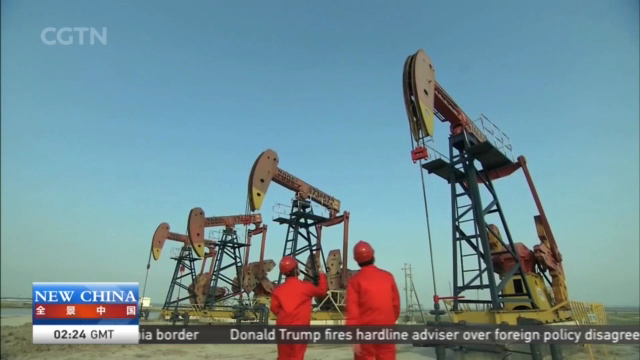
12:10, 11-Sep-2019
New China - 70 Years On: Daqing to keep up with national energy strategy for the future
Updated
13:24, 11-Sep-2019

China's northeast is known for its rich petroleum resources. In Heilongjiang province, the city of Daqing helped spark China's industrial development. But in recent years, the country's largest oilfield has reached a critical point. CGTN's Feng Yilei shows us what's next for the region.
Daqing, China's oil capital, literally means the big celebration. Back in 1959 when the "black gold" was first discovered here, it was indeed a big celebration for the developing country in urgent need of a strong power base.
YE PENG, DEPUTY DIRECTOR EOR PROJECT MANAGEMENT DEPT., DAQING OILFIELD COMPANY "Daqing oilfield is of great importance to China in ridding its bad name of being deficient in oil. Crude self-sufficiency has greatly enhanced the national industrial development."
Until now, hundreds of thousands of workers have held to a devoted and pioneering spirit, paid in sweat equity on this land. That led to the Daqing miracles- not only has it created an abundant energy supply for the country, it is also one of few oilfields in the world that has maintained a stable annual production of 50 million tons for nearly three decades. But today, even the oldest reservoir has to face the common curse--depletion.
YE PENG, DEPUTY DIRECTOR EOR PROJECT MANAGEMENT DEPT., DAQING OILFIELD COMPANY "Our tertiary oil recovery technologies now lead the world, which can increase over 240 million tons of recoverable remaining reserves. That means stable output of 10 million tons for at least 24 years. But now the remaining reserves exist in a more complicated way. New techniques are like gouging oil out of small rock cracks."
Conquering technological obstacles for more advanced recovery methods, while reducing costs is one of the most imperative tasks for Daqing's oil sustainability. But it is also worth noting that not long before, China's reliance on crude oil imports rose as high as 70%. And natural gas is playing a bigger role in energy production as a cleaner fossil fuel substitute. The national strategy of energy diversification suggests Daqing also needs to break the crude stranglehold.
JIN HUI, DEPUTY DIRECTOR DEVELOPMENT DEPT., DAQING OILFIELD COMPANY "Daqing's gas output now takes up about 10% of the 40-million-ton annual production goal of oil and gas. It is expected to double by the 100th anniversary of the oilfield as domestic oil production dwindles."
In the near future, experts believe China will remain the biggest energy consumer and stay oil-hungry to fuel its rapid growth- for example, increasing car ownership.
FENG YILEI DAQING "But in the meantime, China is encouraging more vehicles to use alternative energy and ditch fossil fuels. Here in Daqing, new energy car production is also on the rise at the Volvo factory."
The manufacturer has promised to make half of its sales all-electric by 2025. It is one of the many cases that reflect China's determination to accelerate into a zero-emission era that industries and cities relying on oil have to keep up with.
PROF. ZHOU DADI ENERGY RESEARCH INSTITUTE, NATIONAL DEVELOPMENT AND REFORM COMMISSION "China committed in the Paris Treaty to reach the peak of carbon emissions by 2030. So the growth for fossil fuel is limited in the next decade. The time for us to replace coal with oil has passed. Natural gas is playing a considerable part in replacement, but sooner or later, it will also give way to low-carbon transformation."
Chinese oil and gas giants like Daqing have tried also to devote to new energy application technologies, oilfield land and ecological resource development. They hope to continue to play a role in the renewable, sustainable trend- to extend their glory days beyond an oilfield lifespan. Feng Yilei, CGTN, Daqing.
SITEMAP
Copyright © 2018 CGTN. Beijing ICP prepared NO.16065310-3
Copyright © 2018 CGTN. Beijing ICP prepared NO.16065310-3